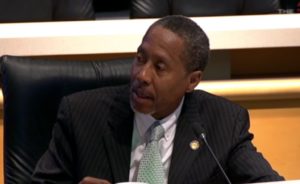 If Florida’s statewide teachers union were to win in a lawsuit challenging the state’s tax credit scholarship program, how would that affect public schools?
If Florida’s statewide teachers union were to win in a lawsuit challenging the state’s tax credit scholarship program, how would that affect public schools?
That’s a question key state senators say they intend to answer.
During the first meeting of the Senate’s education appropriations panel to prepare for the 2017 legislative session, Sen. Darryl Rouson, D-St. Petersburg, asked today what would happen if the roughly 98,000 low-income and working-class students on scholarships “have to be absorbed back into the public schools because they cannot avail themselves of the scholarships.”
The subcommittee’s new chairman, Sen. David Simmons, R-Maitland, said Rouson raised an “excellent question,” and he expects the committee will produce an analysis on the topic “in a matter of days.”
The analysis could shed important light on a key subplot in the legal battle over the nation’s largest private school choice program, as well as the bigger question about how the scholarship program affects public schools. (Step Up For Students, which publishes this blog, helps administer the scholarship program.)
So far, both a trial court and a unanimous three-judge appellate panel have ruled the lawsuit challenging the program should be dismissed, because the Florida Education Association and other plaintiffs cannot show the scholarships harm public schools. The union, however, wants the state Supreme Court to hear an appeal.
A group that opposes the lawsuit recently published a full-page ad in the Tallahassee Democrat. It calculated that if the scholarship program were eliminated, the state would gain $538.4 million in new revenue that currently goes to tax credits, but would face $682.4 million in new expenses, because scholarships are only worth 82 percent of state per-pupil operating expenses. In addition, the group contends public schools would face more $1.1 than billion in construction costs to build new classrooms for only half of the returning students.
In other words, scholarship supporters argue that if the lawsuit succeeds, it could add hundreds of millions of dollars in fiscal strain to an already-tight state budget.
Members of the committee discussed how they would come up with $200 million in new funding to cover existing enrollment growth in public schools, while finding money for other priorities identified by Simmons, like increasing teacher pay and funding an extra hour of reading in the state’s lowest-performing public schools.



Seems to me that for all students this would be a lose, lose situation. Public school would have to reabsorb students who do not fit and students who do not fit public school way of teaching, thus causing chaos to both. School is not a one school setting fits all!
if this isn’t enough to stop these ridiculous lawsuits, I give up. furthermore, how dare the education assn waste the time and resources of the Supreme Court. infuriating!